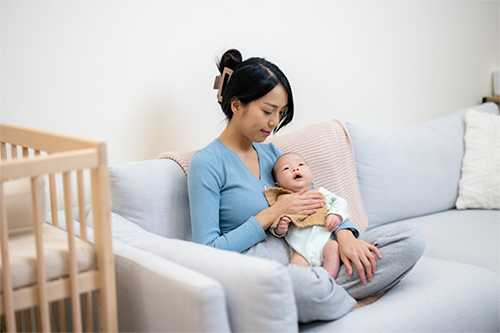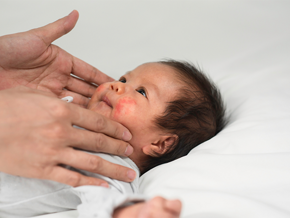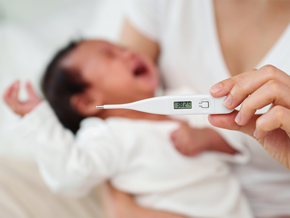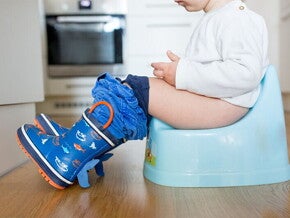
It’s the end of the day, and just like clockwork, the intense crying begins. Your little one is fed and clean, but nothing seems to help. If this scenario sounds familiar, you may be dealing with colic in babies. Here, you’ll find clear answers on what colic is and practical steps you can take right now to bring your baby comfort.
What Is Colic in Babies?
And, how to know if your baby has colic? Colic is when an otherwise healthy and well-fed baby has frequent, prolonged, and intense crying spells.
For years, the "rule of 3s" had been used to diagnose colic: crying for more than 3 hours a day, for more than 3 days a week, for over 3 weeks. Doctors now also use the more modern Rome IV criteria, which defines colic as recurrent crying in babies under 5 months who are otherwise healthy, gaining weight, and free of illness.
The crying episodes often happen around the same time each day, usually in the late afternoon or evening. Common colic symptoms include:
- Intense, high-pitched crying that starts and stops suddenly
- A flushed, red face
- Clenched fists, a tense and hard abdomen, and an arched back
- Pulling their knees up to their chest
- Crying that isn’t easily soothed by feeding, rocking, or a diaper change
The good news is that colic is temporary—most babies outgrow it by 3 to 4 months.
10 Ways to Soothe Your Baby

A change in position can soothe a colicky baby. Try holding them upright or across your lap for a gentle back massage.
Wondering how to relieve colic in babies? The AAFP and AAP suggest trying different feeding adjustments, holding positions, and calming motions.
While there is no single method that works for every child, these soothing strategies can help bring comfort and relief.
1. Adjust your feeding and burping technique.
To help prevent trapped gas, hold your baby in a more upright position while they eat. Don’t wait until the feeding is over. Burp them during and after each session to release air bubbles before they cause discomfort.
2. Try different ways to hold your baby.
Sometimes a change in position is all it takes. Try holding your baby up if they're on their back or carry them facing outward instead of toward your chest to distract them with a different view of their surroundings.
3. Use a gentle rhythmic motion.
Try rocking them in your arms, putting them in an infant swing, or taking them for a walk in the stroller. Some parents find that a car ride helps.
4. Provide skin-to-skin contact.
Cuddle your baby, put them in a cross-body sling, or hold them close against your bare chest. This skin-to-skin contact is reassuring and can help regulate their breathing and heart rate.
5. Use calming sensations.
You can also engage your baby's other senses to help them relax. Try:
- A warm bath to help relax tense muscles.
- White noise, even if it’s just the constant, low hum of a fan, a sound app, or a washing machine. These can mimic the womb environment.
- A pacifier, since sucking is a natural self-soothing reflex for babies.
6. Give a gentle massage.
A baby massage for colic can work wonders. The AAFP suggests holding your baby across your arm or lap while gently massaging their back. This pressure on their tummy can feel very comforting. Ask your doctor for guidance.
7. Manage stimulation levels.
So, how do you avoid colic in infants who are sensitive to their environment? In the evenings, try dimming the lights and lowering the noise in your home. According to the AAP, creating a calmer space can help prevent them from becoming overwhelmed.
8. Ask about your diet when breastfeeding.
The AAFP notes that some foods in your diet (like caffeine, dairy, or nuts) could potentially affect your baby. Talk to your pediatrician if you’re concerned about foods to avoid during breastfeeding to prevent colic.
9. Talk to your doctor about probiotics.
A 2020 review in BMJ Open found that probiotics have the strongest scientific support of all common colic remedies. The study highlighted the strain Lactobacillus reuteri as effective for reducing crying time in breastfed babies.
Always talk to your pediatrician before starting any treatment.
10. Take a break and ask for help.
Caring for a colicky baby can be emotionally draining. It’s essential to look after your own well-being. Ask a partner, friend, or family member to take over for a bit so you can step away and recharge.
Best Sleeping Position for a Colicky Baby
Even when dealing with colic, safe sleep practices are the top priority. The best sleeping position for a colic baby is still on their back in a crib with a firm mattress and no loose bedding.
While placing your baby on their tummy can help relieve gas, it should only be done when they're awake and supervised, such as during tummy time. Never put your baby to sleep on their stomach or side, as this increases the risk of Sudden Infant Death Syndrome (SIDS).
Possible Causes of Colic in Babies
The exact causes of colic in babies are still unknown, but experts believe it involves several factors.
An imbalance in the gut microbiome
Recent research suggests a major cause of colic is an imbalanced gut microbiome. A 2022 review in the World Journal of Gastroenterology found that colicky babies often have fewer "good" bacteria (like Lactobacillus and Bifidobacterium).
Instead, they have more of the "less helpful" bacteria (like Proteobacteria) in their digestive systems, which can cause gas and discomfort that lead to crying spells.
An immature digestive system
According to the American Academy of Family Physicians (AAFP), one of the causes of colicky pain is due to your baby's underdeveloped digestive system, which can make it hard for them to process food, causing discomfort.
Overstimulation
The American Academy of Pediatrics (AAP) also notes that colicky babies may be more sensitive to their surroundings. Because their nervous system is still developing, they can't self-soothe or regulate their response to the world around them.
By evening, the day's stimulation can become too much, resulting in fussy, prolonged crying.
Food sensitivities or allergies
A true food allergy—an immune system reaction with symptoms like hives, difficulty breathing, or vomiting—is rarely the cause of colic. Instead, some babies have food sensitivities.
While the causes aren’t fully understood, know that colic isn't your fault. It’s a common, temporary condition, and your baby’s crying doesn’t mean you’re doing anything wrong.
When to Call Your Pediatrician
If your baby’s crying is accompanied by fever, vomiting, or poor feeding, it’s important to see a pediatrician right away.
Colic is not harmful, but its symptoms can sometimes overlap with other medical issues. Call your doctor if your baby's crying is accompanied by any of the following:
- A fever of 38°C (100.4°F) or higher
- Vomiting or diarrhea
- Poor feeding or weight loss
- Fewer wet diapers than usual
- Being less active or harder to wake up
While colic in babies can be a challenging experience, know that you're doing a great job providing love and comfort during this challenging phase.
If you’re looking for more support, connect with other parents on the ParentTeam Moms and Dads Facebook group and ask your questions about colic in babies.
References
Capozza, Manuela, Nicola Laforgia, Valentina Rizzo, Silvia Salvatore, Stefano Guandalini, and Mariella Baldassarre. “Probiotics and Functional Gastrointestinal Disorders in Pediatric Age: A Narrative Review.” Frontiers in Pediatrics 10 (2022). https://doi.org/10.3389/fped.2022.805466.
Cleveland Clinic. “Colic.” Last reviewed May 19, 2025. https://my.clevelandclinic.org/health/diseases/10823-colic.
Hjern, A., K. Lindblom, A. Reuter, and S-A. Silfverdal. “A Systematic Review of Prevention and Treatment of Infantile Colic.” Acta Paediatrica 109, no. 9 (September 2020): 1733–44. https://doi.org/10.1111/apa.15247.
Mayo Clinic Staff. “Colic.” Mayo Clinic. April 5, 2022. https://www.mayoclinic.org/diseases-conditions/colic/symptoms-causes/syc-20371074.
MedlinePlus. “Colic and Crying - Self-Care.” MedlinePlus, National Library of Medicine. Last reviewed July 1, 2023. https://medlineplus.gov/ency/patientinstructions/000753.htm.
Nemours KidsHealth. “Colic.” Medically reviewed by Melanie L. Pitone, MD. October 2023. https://kidshealth.org/en/parents/colic.html.
NHS. “Colic.” Page last reviewed April 26, 2022. https://www.nhs.uk/conditions/colic/.
Pacheco, Danielle. “The Best Sleeping Position for a Gassy Baby.” Sleep Foundation. Medically reviewed by Nilong Vyas, MD, MPH. Updated July 29, 2025. https://www.sleepfoundation.org/sleeping-positions/best-sleeping-position-for-gassy-baby.
Rhoads, Jon, James Collins, Nicole Y. Fatheree, and Syed Shahrukh Hashmi. “Infant Colic Represents Gut Inflammation and Dysbiosis.” The Journal of Pediatrics 203 (August 2018): Suppl 1. https://doi.org/10.1016/j.jpeds.2018.07.042.




























